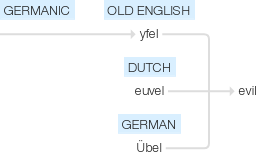Evil
Old English yfel, of Germanic origin; related to Dutch euvel and German Übel .
wiktionary
From Middle English yvel, evel, ivel, uvel, from Old English yfel, from Proto-West Germanic *ubil, from Proto-Germanic *ubilaz [1] (compare Saterland Frisian eeuwel, Dutch euvel, Low German övel, German übel), from Proto-Indo-European *h₂upélos (compare Old Irish fel(“bad, evil”), from Proto-Celtic *uɸelos [2]), diminutive of *h₂wep(h₁)-, *h₂wap-(“treat badly”) (compare Hittite 𒄷𒉿𒀊𒍣(huwapp-i, “to mistreat, harass”), 𒄷𒉿𒀊𒉺𒀸(huwappa-, “evil, badness”)), [3] or alternatively from *upélos(“evil”, literally “going over or beyond (acceptable limits)”), from Proto-Indo-European *upo, *h₃ewp-(“down, up, over”).
From Middle English yvel, evel, ivel, uvel(“evilly”), from Old English yfele, yfle(“evilly”), a derivative of the noun yfel(“evil”). Often reinterpreted as the noun in the later language (as in "to speak evil").
etymonline
evil (adj.)
Old English yfel (Kentish evel) "bad, vicious, ill, wicked," from Proto-Germanic *ubilaz (source also of Old Saxon ubil, Old Frisian and Middle Dutch evel, Dutch euvel, Old High German ubil, German übel, Gothic ubils), from PIE *upelo-, from root *wap- "bad, evil" (source also of Hittite huwapp- "evil").
In Old English and other older Germanic languages other than Scandinavian, "this word is the most comprehensive adjectival expression of disapproval, dislike or disparagement" [OED]. Evil was the word the Anglo-Saxons used where we would use bad, cruel, unskillful, defective (adj.), or harm (n.), crime, misfortune, disease (n.). In Middle English, bad took the wider range of senses and evil began to focus on moral badness. Both words have good as their opposite. Evil-favored (1520s) meant "ugly." Evilchild is attested as an English surname from 13c.
The adverb is Old English yfele, originally of words or speech. Also as a noun in Old English, "what is bad; sin, wickedness; anything that causes injury, morally or physically." Especially of a malady or disease from c. 1200. The meaning "extreme moral wickedness" was one of the senses of the Old English noun, but it did not become established as the main sense of the modern word until 18c.
As a noun, Middle English also had evilty. Related: Evilly. Evil eye (Latin oculus malus) was Old English eage yfel. The jocular notion of an evil twin as an excuse for regrettable deeds is by 1986, American English, from an old motif in mythology.
evil (n.)
"anything that causes injury, anything that harms or is likely to harm; a malady or disease; conduct contrary to standards of morals or righteousness," Old English yfel (see evil (adj.)).
